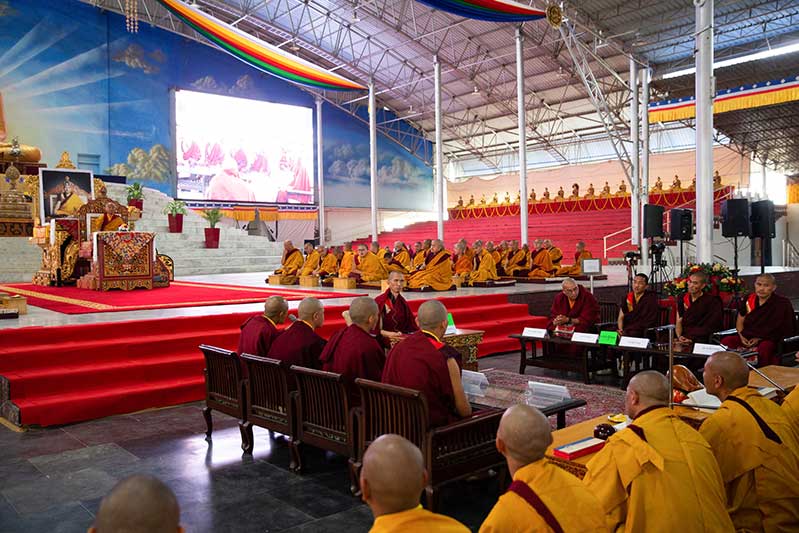
Monlam Pavillion
January 28, 2020
Last year, in response to a suggestion from the Gyalwang Karmapa, two evening debates were held during the 36th Kagyu Monlam. The first debate addressed the question of, “Is it proper to rely on worldly deities as a refuge?” and the second, “Is practice more important than study?” These were not traditional Tibetan- style debates nor were they fully Western-style. Rather, they were an experimental hybrid: two teams of four monks arguing opposing positions from a Buddhist perspective, using evidence from the sutras, commentaries, and Buddhist hagiographies.
The experiment continued this year.
The first session of debate was moderated by Khenpo Choegyal of Thrangu Shedra in Nepal, and concerned the consumption of alcohol by tantric practitioners. It was organised into three distinct sections: presentation of the arguments from both sides, questions from the audience, and a summing up.
The arguments for and against seemed to revolve around two main issues. The first concerned the nature or level of a tantric practitioner. The second was whether, based on sutra and Vinaya, it was permissible to drink alcohol at all.
The proponents were obviously thinking of highly realised tantric practitioners and supported their argument with reference to Marpa, Milarepa, Gampopa and Dusum Khyenpa, all of whom were known to partake of alcohol. Though the Buddha said it was inappropriate to drink alcohol except occasionally as medicine during serious illness, these rules did not apply to advanced practitioners. Whereas ordinary people might drink for pleasure, such highly-realised practitioners were able to transform alcohol into nectar. Drukpa Kunley even claimed that tantric lamas should drink as much alcohol as possible. Indeed, a ngakpa would incur faults if they failed to drink alcohol, as it is the source of prajna. They argued that it was important to distinguish between different types of people. Though it is forbidden to drink alcohol in the sutras, this prohibition does not apply in tantra. The 84 Indian Mahasiddhas all drank alcohol, the Indian saffron-robed practitioners and the Indian white-robed lay practitioners drank alcohol, and Guru Rinpoche’s cup contained alcohol not tea!
The opponents argued that it was essential to follow the teachings of Lord Buddha and the great masters of the past and referred to the words of Guru Rinpoche, Shantideva and Je Tsongkhapa in condemning alcohol consumption. The sutras were clear that alcohol is the source of all faults, and Gampopa said that in order to practise the dharma you must abstain from drinking alcohol. The opponents took the view that advanced tantric practitioners, such as Marpa and Milarepa, who are able to transform alcohol into nectar are extremely rare and a special case which could not be used as a general argument for all tantric practitioners. Until one has attained such a high level of realisation, alcohol is harmful. If you want to see Yama, the King of Death, then drink alcohol. If you want to go to the lower realms, drink alcohol.
Proponent Trinley Dorje from Lava Shedra dismissed the opposition’s arguments with the analogy: It’s like asking “Where did father go?” and receiving the reply, “Mother went to fetch water.”
The debate included an opportunity for members of the audience to ask questions or make comments, and concluded with a summing up by Khenpo Choegyal.

































